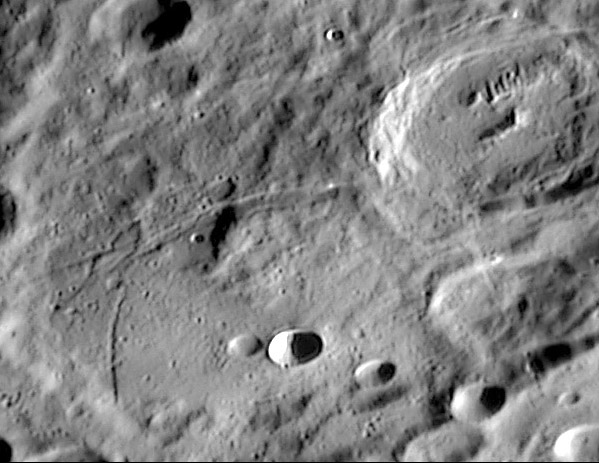
image by Richard Bosman
Nearly all lunar rilles are in maria because rilles form from volcanic eruptions (sinuous rilles) or by bending as a basin subsides (concentric rilles). Highland rilles are rare, but they exist. The most famous one is on the floor of the 190 km wide crater Janssen, south of Mare Nectaris. The rille cuts through ejecta from the Nectaris impact (rough material at the north end of Janssen) but is buried by Fabricus and its ejecta. The width of the rille appears to be directly related to the thickness of the deposit it cuts. It is about 5 km wide where it exists in the thick Nectaris ejecta near Fabricus and narrows instantly to 1-2 km where it enters the smoother plains material on Janssen’s floor. This high resolution image shows that the two segments are not connected, indeed the broad rille has narrow pieces that continue in the direction it was going. The small rille looks like it might enclose pits similar to those in the Hyginus Rille. The smooth material is generally considered to be fluidized Nectaris ejecta and the stuff near Fabricus is more blocky ejecta. I still don’t understand why either is cut by rilles, but if those are pits in the narrow segment, volcanism seems implicated. Finally, look at the bottom right quarter of the image. Do you see the two narrow straight segments on either side of the squashed crater Fabricus A? My eye joins these together and searches for an explanation. Perhaps its just random alignments…but Janssen is a deserving target for high res low Sun imaging.
Technical Details:
280 mm SCT + 3X barlow + ATK-2HS camera.
Related Links:
Rükl plates 67 & 68
Richard’s website
Yesterday's LPOD: LPOD Needs Your Images!
Tomorrow's LPOD: Is Marth a Concentric Crater?
COMMENTS?
Register, Log in, and join in the comments.



